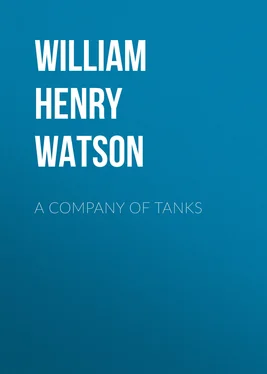William Henry Lowe Watson - A Company of Tanks
Здесь есть возможность читать онлайн «William Henry Lowe Watson - A Company of Tanks» — ознакомительный отрывок электронной книги совершенно бесплатно, а после прочтения отрывка купить полную версию. В некоторых случаях можно слушать аудио, скачать через торрент в формате fb2 и присутствует краткое содержание. Жанр: foreign_prose, История, foreign_edu, foreign_antique, на английском языке. Описание произведения, (предисловие) а так же отзывы посетителей доступны на портале библиотеки ЛибКат.
- Название:A Company of Tanks
- Автор:
- Жанр:
- Год:неизвестен
- ISBN:нет данных
- Рейтинг книги:3 / 5. Голосов: 1
-
Избранное:Добавить в избранное
- Отзывы:
-
Ваша оценка:
- 60
- 1
- 2
- 3
- 4
- 5
A Company of Tanks: краткое содержание, описание и аннотация
Предлагаем к чтению аннотацию, описание, краткое содержание или предисловие (зависит от того, что написал сам автор книги «A Company of Tanks»). Если вы не нашли необходимую информацию о книге — напишите в комментариях, мы постараемся отыскать её.
A Company of Tanks — читать онлайн ознакомительный отрывок
Ниже представлен текст книги, разбитый по страницам. Система сохранения места последней прочитанной страницы, позволяет с удобством читать онлайн бесплатно книгу «A Company of Tanks», без необходимости каждый раз заново искать на чём Вы остановились. Поставьте закладку, и сможете в любой момент перейти на страницу, на которой закончили чтение.
Интервал:
Закладка:
Towards the middle of February our training became more ingenious and advanced. As painfully few real tanks were available for instruction, it was obviously impossible to use them for tactical schemes. Our friendly Allies would have inundated the Claims Officer if tanks had carelessly manœuvred over their precious fields. In consequence the authorities provided dummy tanks.
Imagine a large box of canvas stretched on a wooden frame, without top or bottom, about six feet high, eight feet long, and five feet wide. Little slits were made in the canvas to represent the loopholes of a tank. Six men carried and moved each dummy, lifting it by the cross-pieces of the framework. For our sins we were issued with eight of these abortions.
We started with a crew of officers to encourage the men, and the first dummy tank waddled out of the gate. It was immediately surrounded by a mob of cheering children, who thought it was an imitation dragon or something out of a circus. It was led away from the road to avoid hurting the feelings of the crew and to safeguard the ears and morals of the young. After colliding with the corner of a house, it endeavoured to walk down the side of the railway cutting. Nobody was hurt, but a fresh crew was necessary. It regained the road when a small man in the middle, who had been able to see nothing, stumbled and fell. The dummy tank was sent back to the carpenter for repairs.
We persevered with those dummy tanks. The men hated them. They were heavy, awkward, and produced much childish laughter. In another company a crew walked over a steep place and a man broke his leg. The dummies became less and less mobile. The signallers practised from them, and they were used by the visual training experts. One company commander mounted them on waggons drawn by mules. The crews were tucked in with their Lewis guns, and each contraption, a cross between a fire-engine and a triumphal car in a Lord Mayor's Show, would gallop past targets which the gunners would recklessly endeavour to hit.
Finally, these dummies reposed derelict in our courtyard until one by one they disappeared, as the canvas and the wood were required for ignobler purposes.
We were allowed occasionally to play with real tanks. A sham attack was carried out before hill-tops of generals and staff officers, who were much edified by the sight of tanks moving. The total effect was marred by an enthusiastic tank commander, who, in endeavouring to show off the paces of his tank, became badly ditched, and the tank was for a moment on fire. The spectators appeared interested.
On another day we carried out experiments with smoke-bombs. Two gallant tanks moved slowly up a hill against trenches. When the tanks drew near, the defenders of the trenches rushed out, armed with several kinds of smoke-producing missiles. These they hurled at the tanks, and, growing bolder, inserted them into every loophole and crevice of the tanks. At length the half-suffocated crews tumbled out, and maintained with considerable strength of language that all those who had approached the tanks had been killed, adding that if they had only known what kind of smoke was going to be used they would have loaded their guns to avoid partial asphyxiation.
In addition to these open-air sports, the senior officers of the battalion carried out indoor schemes under the colonel. We planned numerous attacks on the map. I remember that my company was detailed once to attack Serre. A few months later I passed through this "village," but I could only assure myself of its position by the fact that there was some brick-dust in the material of the road.
By the beginning of March the company had begun to find itself. Drill, training, and sport had each done their work. Officers and men were proud of their company, and were convinced that no better company had ever existed. The mob of men had been welded into a fighting instrument. My sergeant-major and I were watching another company march up the street. He turned to me with an expression of slightly amused contempt.
"They can't march like us, sir!"
CHAPTER III.
BEFORE THE FIRST BATTLE.
( March and April 1917. )
In the first months of 1917 we were confident that the last year of the war had come. The Battle of the Somme had shown that the strongest German lines were not impregnable. We had learned much: the enemy had received a tremendous hammering; and the success of General Gough's operations in the Ancre valley promised well for the future. The French, it was rumoured, were undertaking a grand attack in the early spring. We were first to support them by an offensive near Arras, and then we would attack ourselves on a large scale somewhere in the north. We hoped, too, that the Russians and Italians would come to our help. We were told that the discipline of the German Army was loosening, that our blockade was proving increasingly effective, and we were encouraged by stories of many novel inventions. We possessed unbounded confidence in our Tanks.
Late in February the colonel held a battalion conference. He explained the situation to his company commanders and the plan of forthcoming operations.
As the result of our successes in the Ancre valley, the German position between the Ancre and Arras formed a pronounced salient. It was determined to attack simultaneously at Arras and from the Ancre valley, with the object of breaking through at both points and cutting off the German inside the salient.
Colonel Elles had offered two battalions of tanks. He was taking a risk. Officers and crews were only half-trained. Right through the period of training real tanks had been too scarce. Improved tanks were expected from England, but none had arrived, and he decided to employ again the old Mark I. tank which had been used in the operations on the Somme in the previous year. The two battalions selected were "C" and "D."
When we examined the orders for the attack in detail, I found that my company was destined to go through with the troops allotted to the second objective and take Mercatel and Neuville Vitasse. It should have been a simple enough operation, as two conspicuous main roads penetrated the German lines parallel with the direction of my proposed attack.
On March 9th I drove to Arras in my car with Haigh, my second-in-command, and Jumbo, my reconnaissance officer. We went by St Pol and the great Arras road. The Arras road is a friend of mine. First it was almost empty except for the lorry park near Savy, and, short of Arras, it was screened because the Germans still held the Vimy Ridge. Then before the Arras battle it became more and more crowded—numberless lorries, convoys of huge guns and howitzers, smiling men in buses and tired men marching, staff-cars and motor ambulances, rarely, a waggon with slow horses, an old Frenchman in charge, quite bewildered by the traffic. When the battle had begun, whole Divisions, stretching for ten miles or more, came marching along it, and the ambulances streamed back to the big hospital at St Pol. I saw it for the last time after the Armistice had been signed, deserted and unimportant, with just a solitary soldier here and there standing at the door of a cottage. It is an exposed and windy road. The surface of it was never good, but I have always felt that the Arras road was proud to help us. It seemed ever to be saying: "Deliver Arras from shell and bomb; then leave me, and I shall be content to dream again."…
We drove into Arras a little nervously, but it was not being shelled, and, hungry after a freezing ride, we lunched at the Hôtel de Commerce.
This gallant hotel was less than 2500 yards from the German trenches. Across the street was a field battery in action. The glass of the restaurant had been broken, the upper stories had been badly damaged, the ceiling of the dining-room showed marks of shrapnel. Arras was being shelled and bombed every night, and often by day; German aeroplanes flew low over the town and fired down the streets. The hotel had still carried on ever since the British had been in Arras and before. The proprietress, a little pinched and drawn, with the inevitable scrap of fur flung over her shoulders, presided at the desk. Women dressed in the usual black waited on us. The lunch was cheap, excellently cooked, and well served—within easy range of the enemy field-guns. After the battle the hotel was put out of bounds, for serving drinks in forbidden hours. Indeed, A.P.M.'s have no souls. It reopened later, and continued to flourish until the German attack of April 1918, when the enemy shelling became too insistent. The hotel has not been badly hit, and, if it be rebuilt, I beseech all those who visit the battlefields of Arras to lunch at the Hôtel de Commerce—in gratitude. It is in the main street just by the station.
Читать дальшеИнтервал:
Закладка:
Похожие книги на «A Company of Tanks»
Представляем Вашему вниманию похожие книги на «A Company of Tanks» списком для выбора. Мы отобрали схожую по названию и смыслу литературу в надежде предоставить читателям больше вариантов отыскать новые, интересные, ещё непрочитанные произведения.
Обсуждение, отзывы о книге «A Company of Tanks» и просто собственные мнения читателей. Оставьте ваши комментарии, напишите, что Вы думаете о произведении, его смысле или главных героях. Укажите что конкретно понравилось, а что нет, и почему Вы так считаете.












